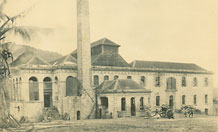
Photograph showing Gale’s Valley sugar works, Jamaica
Reunited documents offer slave trade insight
The missing links in a major collection of documents about the English slave trade and plantations in Jamaica have been reunited. The University of Exeter Library has been awarded two prestigious grants worth £16,500 to purchase the set of slave trade papers to complete its Gale Morant collection.
The Gale Morant archive contains letters and accounts of three sugar plantations in Jamaica, dating from the later 18th century through to abolition and beyond. Two families from England who intermarried owned the plantations and their agents managed the day-to-day running of the plantations and kept close accounts of all transactions. The estate accounts provide some information on the ethnic origins of the slaves, on health and ailments, and the resources it took to run the business. The archive often makes uncomfortable reading, as the brief entries in the lists of slaves for each estate treat human beings as ‘stock’. They also provide information on births and deaths in stark account entries entitled ‘increases’ and ‘decreases’.
Rare Book Dealer Samuel Gedge contacted the University of Exeter when he found that a collection he was offering for sale was remarkably similar to the Gale Morant archive. When Gedge saw the Exeter archive catalogue he immediately realised that the two sets of papers must have originally come from the same family collection.
Grants to purchase the slave trade papers were secured from the Museum Libraries and Archives Council’s/Victoria and Albert Purchase grant fund and the Friends of the National Libraries, as well as from internal resources.
Dr Christine Faunch, Head of Heritage Collections and Culture Services at the University of Exeter, said: “We have a collection of slave trade papers at Exeter amounting to 400 documents; we have always known that there were gaps in this collection, but had no idea that another set of papers from the same archive still existed. Samuel Gedge’s collection will supply some of the missing documents from our own archive. It was an extraordinary discovery.”
She added, “As soon as we knew that these two collections were actually one and the same we began fund-raising to raise the purchase price of £24,000. Archives such as this also complement the national official records on slavery and its abolition in the National Archives, by helping to provide an insight into what actually happened both before and after abolition.”
The archive already owned by Exeter is used for research and teaching, particularly in Geography. A selection of the papers are digitised and available on the Digital Collections Online. Dr Nichola Thomas, Senior Lecturer in Geography, uses these with her students. Dr Thomas said: “This acquisition is highly significant as the papers will enable researchers to gain a deeper understanding of the Gale Morant plantation holdings and the relations that underscored their colonial enterprise. Researching these sorts of papers is essential if we are to understand the period of history that was underscored by the unjust enslavement of people of African origin.”
She added, “Until the acquisition of these papers we only had a partial insight into the origin and activities of enslaved workers, the financial accounts and day-to-day management of the Gale Morant estates. With these new papers we will be able to expand our understanding of the 18th- and early 19th-century plantation economy.”
The new Gale and Morant papers will be added to the collections and catalogued. The Heritage Collections team will also be keeping a digital record of ‘what happens to an archive’ from accession to access in the reading room at the University of Exeter.
Date: 2 August 2011
